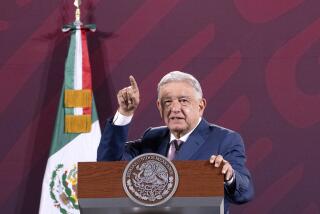Scandal Ousts Former Baja Governor From Diplomatic Post
- Share via
In a widening corruption scandal involving the former Baja California state government, Mexican officials have announced that former Baja Gov. Xicotencatl Leyva Mortera violated federal financial reporting rules and will be suspended from his diplomatic post.
As an ex-governor, Leyva was the highest-ranking and best-known of more than 2 dozen officials from throughout the nation charged in Mexico City with violating the so-called Law of Responsibilities, a broad statute aimed at holding public officials accountable for mistakes and misdeeds commited under their leadership. Leyva, acting as first secretary of the Mexican Embassy in Lisbon, Portugal, was charged with not reporting financial holdings, although the specific offenses were not spelled out.
News of the violation--bannered in a huge front-page headline in Baja California’s quasi-official daily El Mexicano, which once extolled Leyva’s every deed as though he were infallible--reverberated through the border state, which has already become inured to almost-daily revelations about alleged misdeeds by dozens of Leyva’s appointees.
The offense commited by Leyva, while administrative and not criminal in nature, amounts to a pronouncement of political disgrace for a man whose photograph hung in every state and local government office throughout the area. In Mexico’s heavily centralized system, governors act as the direct representative of the president.
For the financial-reporting violation, Leyva could be suspended for up to four years from holding any public office. Looming in the background, however, is the possibility of criminal charges, a once-unthinkable eventuality that is now being openly discussed throughout Baja.
More than 2 dozen former Leyva aides are said to be the subject of a broad investigation by the interim administration of the current governor, Oscar Baylon Chacon, who is apparently seeking to bolster lagging public confidence in the ruling Institutional Revolutionary Party, known as the PRI. State authorities have said they plan to seek the extradition of four ex-Baja officials who are believed to have fled to the United States.
President Carlos Salinas de Gortari, national standard-bearer of the PRI, appointed Baylon in January to fill the almost 10 months left in Leyva’s six-year term as governor. The president, who took office Dec. 1, dumped Leyva unceremoniously in January, banishing him to the diplomatic outpost--a political Siberia in the eyes of political observers in Baja. The new charges further tarnish Leyva.
‘Not Used to Things Like This’
“In Mexico we’re not used to things like this happening to an ex-governor,” noted Enrique Garcia Sanchez, news editor of Cambio 21, a feisty Tijuana-based weekly that has kept up a drumbeat of Leyva-related scandals. “This means that the government has recognized that the (Leyva) administration caused great damage to the system. We saw the results of that in the last election.”
Indeed, in July’s election, the candidate of the opposition National Action Party, Ernesto Ruffo Appel, won a resounding victory over the candidate of the long-dominant PRI. The election marked the first time in modern Mexican history that the PRI has recognized the loss of a governor’s seat.
Leyva is a longtime PRI member, and, as governor from 1983 to early 1989, served as the party’s top official in Baja California. Many analysts pinned the blame for the loss in July largely on the checkered legacy of Leyva, who, for critics, typified the cronyism, ineptitude and corruption of decades of PRI leadership.
The finding that Leyva violated financial reporting requirements comes at a time when the news media in Baja have printed widespread speculation indicating that the ex-governor enriched himself during his term as the state’s chief executive, amassing ranches, dwellings, vehicles and other spoils. Although top Mexican officials traditionally have used their positions to attain personal wealth, corruption was considered particularly blatant during the administration of Leyva--an impression that apparently alienated President Salinas, who has expressed his commitment to reform.
Leyva has not commented publicly on the allegations.
More to Read
Sign up for Essential California
The most important California stories and recommendations in your inbox every morning.
You may occasionally receive promotional content from the Los Angeles Times.










